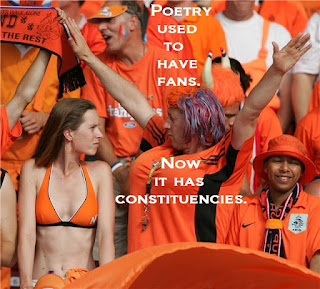 |
| Earl the Squirrel's Rule #52 |
In past centuries poetry sold as well or better than novels. Today, that ratio is about 200 to 1 in favor of fiction. Most of that decline has taken place in the last half century, a period which hasn't produced a single line of broadly recognized verse. We ask: "Why has contemporary poetry failed to find an audience?" Perhaps the answer is the simplest of all: much of it isn't trying to.
Consider the two types of publishers:
1. Indies:
These labors of love almost always confine themselves to the owner's aesthetic. Many are not students of the craft, meaning that they neither know nor care what general readers like. Those who do often don't survive the realization that, like everything else, now as ever, good poetry is rare and outlets are many.
2. Academics:
After months of thought I have finally found an analogy from real life. It wasn't easy. Consider the dog show. To a casual observer, the judges look at all the dogs, assess them by some criteria, and announce a winner. Best dog wins. What's the problem?
We should know that the organizers and participants are not particularly concerned with entertainment value. Dogs need to win enough tournaments to become champions, after which they can bring forth a new generation of that breed. Similarly, poets need publication credentials in order to obtain positions where they can bring forth a new generation of poets.
These dogs are not pets, with lives dedicated to being loved by owners and their families. The job of these canines is to conform to a very narrow, immutable¹ standard better than their competition. Likewise, the aspiring academic. In addition, a unique and technically brilliant poem creates a different kind of standards issue: How can the publisher maintain the new standard set by this game-changer? What will instructors do with a poem that demonstrates techniques they have neither taught nor learned?
 |
| Earl the Squirrel's Rule #45 |
One final similarity: Much of the fun in watching a dog show is in cheering on your favorite breed--probably one you have called your own. How many poets check out periodicals solely to see how those who share their particular aesthetic are faring? Even accounting for lenders, including libraries, poetry's readership may be less than its sales.
| Bill Parcells |
"Don't try to talk a cat down from a fish truck."
Footnotes:
¹ - To change these standards, even slightly, would adversely affect every single existing breeder. Not surprisingly, evolution is slow, careful not to obsolete present stock.
² - Of course, this creates a vicious cycle.

No comments:
Post a Comment
Your comments and questions are welcome.